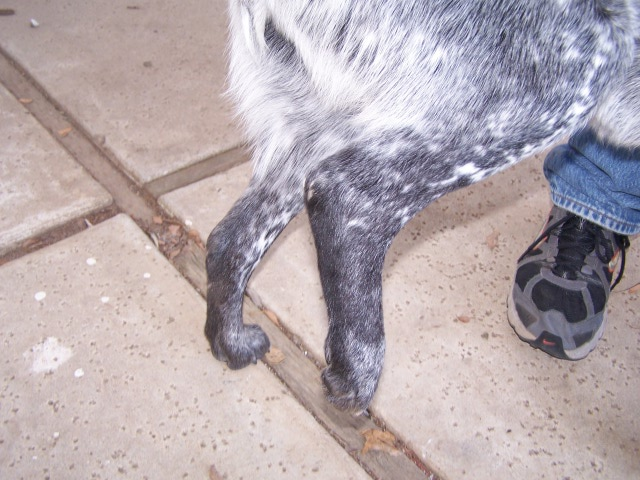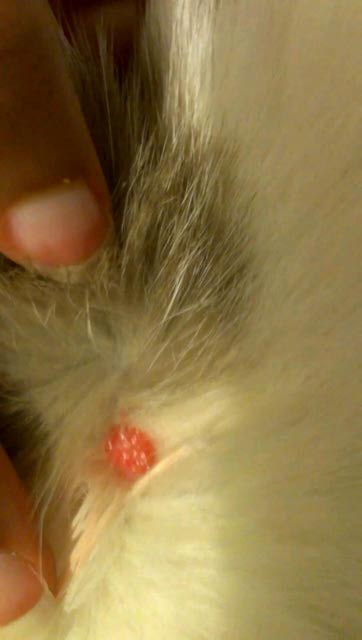QuestionHave you heard of "old dog vecular disease"? A friend has a german shepherd that was just diagnosed with this and I have never heard of it and wondered what it is???
Thanks
AnswerHi Lee!
It surprises some owners that heart disease is common in cats and dogs...just like in humans. Unlike diarrhea or skin disease, the problem is not obvious to the normal owner, but is picked up during either routine exam (another good reason for yearly exams) or when a pet is brought in for coughing, wheezing, poor energy, edema, or bloat.
If your veterinarian suspects heart disease in your dog, here's a list of comments and things you and your vet will be considering.
Exam and History:
There are lots of clues on history such as being tired after a little bit of exercise, coughing after exercise and so forth.
We will be giving your pet a good general exam that will include listening carefully to your pet's heart and lungs, feeling the quality of the pulse, checking the color and nature of the mucus membranes, checking the tiny vessels in the eyes, palpating the abdomen, and maybe rechecking everything after exercise.
We will also be asking a lot of questions that will help us with the diagnoisis and hopefully prevent us from going down some expensive false trails. (such as mistaking indigestion for heart disease and vice versa)
It's interesting that certain breeds are more likely to have certain types of heart disease:
Murmers: Cockers, Poodles, Schnauzers, Dachshunds, Chihuahuas, Pomeranians, and Min. Pinschers
Myocarditis: Boxers, St Bernards, and German Shorthair Pointers
Cardiomyopathy: large breeds of dogs
Heart base tumors: Boston Terriers, Boxers, and English Bulldogs
Various Congential Heart Problems: Poodle, Collies, Poms, Sheperds, Eng. Bulldogs, Schnauzers, Pointers, Keeshonds, Fox Terriers, Irish Setters, and Weimaraners.
Mainly we will be listening carefully to the heart and respiratory sounds and feeling the strength of the pulse. Sometimes we will listen before and after exertion. We will be checking refill time in the gums and mucus membrane color. All in addition, of course, to a nose to tail general exam and history.
Once we suspect heart disease, here's what to expect:
Laboratory Work Up and Radiographs to Consider:
A. Rule out heartworm disease with an elisa test:
B. CBC and Chemistry; this is important because so often heart disease is seen in association with other diseases...especially kidney and liver diseases.
C. Radiographs; to see if the heart is enlarged typical of certain types of heart disease, to see if there are tumors, to see if the lungs are very congested, and to see if there is fluid around the heart.
D. Urinalysis: This test is not likely to tell us anything specific about the heart, but it's included in the work up of pets suspected of serious disease.
Why? Because most serious diseases also involve other organ systems and this fairly inexpensive test of urine gives us a good feel for the heatlh of the kidneys and bladder as well as hints about pancreatic, liver, and gall bladder health. It helps with our asscessment of tissue hydration too.
E. EKG: Not that diagnostic in my in-expert hands except for cardiac emergencies and for what's known as cardiac blocks and arrthymias.
I have an EKG without a printer and again, I am only minimally competent in this area. I use it mailnly to monitor high risk surgeries.
Other vets in my position have a service where they can hook up their EKG (and chest x rays, for that matter) to a phone line that goes to a cardiac specialist who reads the results in real or near real time and helps with the diagnosis.
This is so cool, but still fairly expensive.
And, of course, other vets are highly competent in this area on their own.
At our clinic, if we suspect serious heart disease, we encourage you to go to the several specialists that are available in near-by Greenville or at the Veterinary College.
F. Echo, Ultra Sound, Angiograms, and other types of Imaging: All this is now available in veterinary medicine but not by me or many other general practitioners. Again, something I refer to specialists.
Treatment Options to consider:
1. Consider referral to a specialist for heart disease...Your vet will give you an honest accessment of his or her skill level in treating any serious disease. Don't expect your general practioner to be an expert in everything...especially a complex disease like heart disease where highly specialized equipment is often needed and where new, potentially dangerous, medications are frequently being introduced.
2. At our clinic, if you elect to let me treat your dog after making a tentative diagnosis of heart disease, here's what we'll consider trying:
A. Nutritional support. We'll recommend taking advantage of one the several superior diets made especially to minimize cardiac problems such as H/D or K/D by Hills
B. Weight Loss if appropriate...Many heart disease patients are way too fat.
C. Furosimide tablets as needed to control coughing and congestion. This is a diuretic and will make your dog urinate and drink more but often works well in relieving the fluid load in the lungs associated with heart disease.
D. Digoxin tablets: this poison, given in tiny amounts helps improve cardiac function. This medication is not tolerated by many pets (causes nausea etc), so we will start out with a small dose and work up.
E. Blood Pressure tablets: Ace Inhibitors (Enalapril or Captopril) greatly reduce the work load of the heart by causing dilation of the blood vessels. Possibly dangerous if your pet also has kidney disease. Another reason to do blood work and an urinalysis to check other organ systems.
F. Potassium or Multivitamins; loss of potassium is a problem with both heart disease and the medications used to treat heart disease.
G. Aspirin; small amounts help prevent secondary problems such as blood clots that are sometimes part of the cardiac disease syndrome.
The dose we will be recommending is small enough that problems such as GI inflammation is not likely.
H. Beta Blockers decrease outflow obstruction common in heart disease and are often recommended by cardiac specialists, especially in cardiomyopathy.
I. CoEnzyme Q10: a neutriceutical highly touted by the people that sell it for improving cardiac and vascular health. This is not an accepted medication yet , but I think it helps and I also think it is not harmful, so I like to try it.
It's hard to get approval in the medical industry for neuticeuticals and despite lots of testimonials for these medications it's very hard to get honest information about them. I'm presently a believer in the usefulness of CoEnzyme Q10 but based on pretty flimsy medical evidence. (See my comments on the neutriceutial business in the medication section of this site.)
Supplementation with coenzyme Q10 has resulted in dramatic increases in cardiac contractility in humans with cardiomyopathy. Coenzyme Q10 is a member of the electron transport chain essential in myocardial energy production. Clinical trials examining the efficacy of coenzyme Q10 in the dog are underway.
J. Frequent rechecks. Heart disease and the medications used to treat heart disease both merit frequent rechecking and adjusting.
K. Again...consider referral. Especially if results are poor.
I hope this has been helpful and I wish you the best of luck!Please keep me posted and give that German Shepard dog millions of kisses for me!Sending wagging tails your way!
Nicole

 sick little puggie
Question
lola
My year old chug (chihuahua pug cr
sick little puggie
Question
lola
My year old chug (chihuahua pug cr
 6 month old dog rear legs paralyzed
Question
Teddy
We adopted a lab/st.Bernard mix dog name
6 month old dog rear legs paralyzed
Question
Teddy
We adopted a lab/st.Bernard mix dog name
 Dog broken toe or sprain?
Question
Dog Dog
Hello. I have a 10
Dog broken toe or sprain?
Question
Dog Dog
Hello. I have a 10
 Runny stool, vomiting,
Questionour Pom "Snoball"
QUESTION: Ou
Runny stool, vomiting,
Questionour Pom "Snoball"
QUESTION: Ou
 Red sore on my cat
Question
Cat Sore
Hi. I recently noticed a
Red sore on my cat
Question
Cat Sore
Hi. I recently noticed a